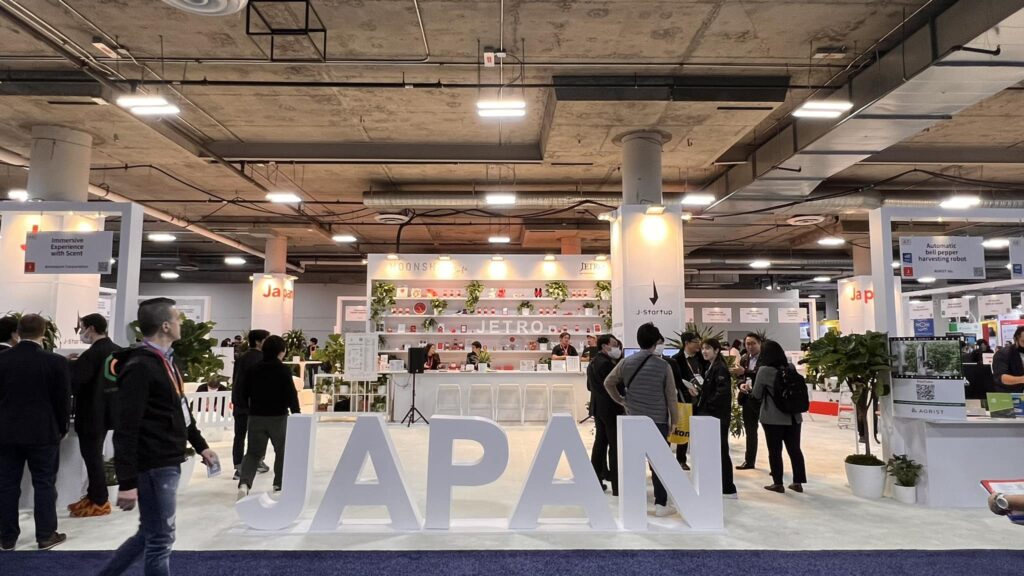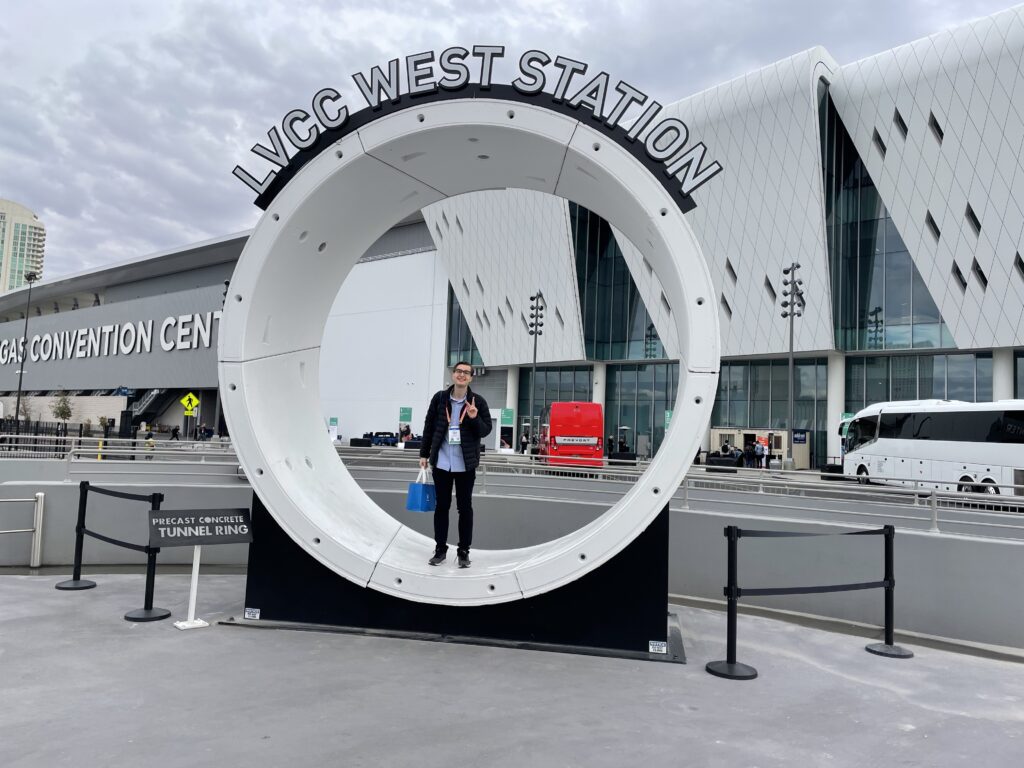Author: Aaron Preiss (linkedin.com/in/alpreiss/)
Date: January 11, 2023
CES 2023 – Introduction

CES 2023 is a wrap!
It’s hard to believe the event was only a few days with how completely packed both the buildings, and my days, were!
It was such a great opportunity to connect with folks. Certainly those that I hadn’t seen since before COVID or used to do work together with (including many former clients), but also the tremendous number of incredible, new people I had the opportunity to link up with.
One of the favorite parts about the event was the equally incredibly opportunity to connect with the Japanese startup ecosystem, which had a major presence at the event. With how many great new and established startups there were, it is hard to believe that just a short while ago, Japan had nearly no ground-swell of startups in the same way as the US. A few trends seem to be driving this shift:
Increased access to capital (especially by new funds and CVCs)
Various supports (monetary & advisory) by local Japanese governments and agencies, like JETRO / J-Startup
A less hostile work/cultural environment to people leaving their work to start new ventures (though this is still very early stages)
The main ‘base’ for Japanese startups at the event was in the “Japan Pavilion”, a decently large booth space in the Venetian Expo space. The space was sponsored by JETRO (a Japanese governmental body), and each of the attending startups could use the space for free, provided they were selected via an application process.

I spent around 2.5 hours going around to speak with each startup there. All of the founders and employees I spoke to were clearly very excited to introduce their new technologies to a willing audience.
Special Areas of Note
Before I highlight further a few of the companies I spoke to, I would be remiss if I didn’t mention a few general observations.
The startups were very hardware-heavy. I counted only a handful of software-first companies out of the 36 in attendance.
Next, the overwhelming majority of the people in the pavilion (guests and startups) were Japanese. And everyone was primarily speaking Japanese. It did seem like a missed opportunity for more of these companies to not speak at greater lengths with other non-Japanese attendees, given all the time, energy, and effort spent in coming out of Japan, all the way to CES in the US. In the reverse direction, any VCs or companies looking to invest or collaborate with the companies, would do good to have a Japanese-speaking staff on hand. Invariably, explanations I received in Japanese were far better and more detailed than those given in English.
On a similar note, it seems likely there were no native speakers of English on-hand to check the different materials and pamphlets being handed out. As a result, the written English could be a tad difficult to understand. If someone had been hired to spend a few hours checking over some of the materials being handed out, I think attendees to the Japan pavilion would have had a clearer picture of each startup’s business area. Also many startup websites are also only in Japanese – some of these language ‘hoops’ may be impediments to potential collaboration.
Highlighted Startups
With that, a few of the interesting companies I spoke to:
AGRIST Inc.

This company has already rolled out a robot that effectively moves on a string. Then, using AI technologies and cameras, it is able to pick the most “harvest-ready peppers with millimeter precision”. It in-of-itself seemed really fascinating; particularly that it has already been implemented on a farm in Japan. The ‘robot’ is highly specialized to pick peppers, so I would be interested to see what other kinds of vegetables or fruits it could be used with.
I imagine a few hurdles related to expansion: namely, startup-costs associated with purchasing a machine, and differences in harvesting processes across countries. The AI technology itself is strong, so there may be a licensing opportunity there as well (outside of purely a hardware play).
MIRAI Speaker (Sound Fun Corporation)

I spoke to Sunano-san at his booth, where he was demo-ing their speaker, which was created to make it easier to hear certain kinds of audio frequencies, achieved by using unique designs and acoustics. The speaker’s main selling point is it makes voices easier to hear. This could have both at-home, and corporate use cases (think: announcement speakers in crowded spaces). Apparently they even managed to sell off their demo units!
Incredible domestic (Japan) and abroad appeal potential. They are also doing a great job of listening to feedback (e.g., reading constantly their Amazon reviews). Instead of the incremental tweaks being made currently based on said feedback, perhaps fewer, large feedback sessions (with US consumers) would be more efficient.
AirPlug (Aeterlink)

I spoke with Yuji-san at his booth. As founder and CEO, he himself has an eclectic background – he has education from Stanford (where he was involved in research), and has a PhD in Engineering from Waseda University (one of the top schools in Japan). His colleagues boast similar bonafides. Which is to say, it is a very technically capable team.
They have designed a wireless power system for buildings, which can semi-autonomously turn on and off air conditioning and other systems. It is sort of like an always-on monitor, like an alarm for a home, waiting for certain environment ‘triggers’ to take effect. The end goal is to reduce unnecessarily emissions associated with, for example, leaving the aircon on all day. It seems they are mostly focused on the Japan market at the moment, with clear opportunity in the States.
Zeals

Zeals was probable the biggest startup there (both in terms of literal size, and capitalization). They recently raised $38.8M (https://techcrunch.com/2022/05/11/japans-zeals-raises-38-8m-to-scale-its-chat-commerce-platform/) to continue their scaling efforts, which includes a further push into the US market. They develop a chatbot which runs via social media pages / chats directly with companies. According to Masahiro-san, the CEO (whom I spoke with), this is a market that has not been directly attacked yet. Very excited to see their continue expansion efforts!
Eukarya.io / Re: Earth (Product Name)

Eukarya.io is the name of the startup that develops Re:Earth, a “free, open and highly extensible WebGIS platform”. There is both a commercial and research angle to their product. As I understand, this company licenses out access to a large database of map information to different organizations, or works with them to develop one. The best way to explain it is its effectively like Apple or Google Maps 3D views, but an open API that can be accessed by anyone. While they have a very beautiful website and interesting tech, I think a bit more clarity into what they are specifically offering would help people better understand how they could leverage their map technology/database.
For those in this space, be sure to check it out!
Next time!

That is just a few I’ll highlight this time around, I intend to cover the rest I spoke with in a future blog installment.
Of note, Taiwan (despite being a far smaller country by any metric), brought 96 startups this year. It would be great to see the Japanese government provide even more support in future CES installments.
https://www.eetasia.com/taiwan-brings-96-startups-to-attend-ces-2023/
The future is looking very bright for Japanese startups, both in and outside Japan. Can’t wait to see how 2023 unfolds for each company!
Till next time – Aaron
